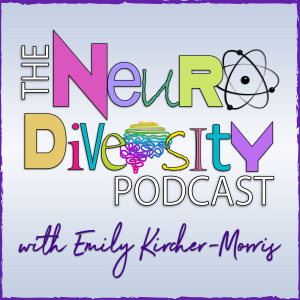
Neurodiversity Podcast
Kids & Family Podcasts
The Neurodiversity Podcast talks with leaders in the fields of psychology, education, and beyond, about positively impacting neurodivergent people. Our goal is to reframe differences that were once considered disabilities or disorders, promote awareness of this unique population, and improve the lives of neurodivergent and high-ability people.
Location:
United States
Description:
The Neurodiversity Podcast talks with leaders in the fields of psychology, education, and beyond, about positively impacting neurodivergent people. Our goal is to reframe differences that were once considered disabilities or disorders, promote awareness of this unique population, and improve the lives of neurodivergent and high-ability people.
Twitter:
@mindmatterspod
Language:
English
Contact:
929-445-8255
Website:
http://mindmatterspodcast.com/
The Over-Under on Achievement with Jim Delisle
Duration:00:34:20
Presuming Competence: A Nonspeaking Person Finds His Voice
Duration:00:35:40
Synesthesia in Cinema: The Making of 'Magnetosphere'
Duration:00:34:03
Building Henry's Classroom: An Advocacy Master Class
Duration:00:34:17
Adult-Diagnosed ADHD: Grieving What Might Have Been
Duration:00:33:50
Parenting Through the Chaos and Finding Peace (reprise)
Duration:00:34:29
Beyond the Lesson Plan: Vulnerability Builds Bridges
Duration:00:34:31
The Pressure and Peril of Perfectionism
Duration:00:35:42
Epilepsy Through the Lens of a Mother's Love
Duration:00:38:20
Finding Magic in Neurodiversity and Vice Versa
Duration:00:35:14
The Self-Regulation Revolution: Mastering Executive Function
Duration:00:38:10
Surfing Waves of Emotion Through Emotional Regulation
Duration:00:39:50
What Behavior is Really Telling Us
Duration:00:39:42
Playing May Be the Most Important Work We Do
Duration:00:42:07
Christopher Willard on Mental Health, Education, and Farts (!?)
Duration:00:36:23
Revisiting Girls and ADHD
Duration:00:35:47
Why Do We Still Debate Overexcitabilities?
Duration:00:33:25
Love on the Spectrum's Kaelynn Partlow on Autism, Advocacy, and Acceptance
Duration:00:32:48
Understanding Yourself: A Process for Finding the Person Inside
Duration:00:40:41
Beyond Buzzwords: Rethinking Our Neurodiversity Discourse
Duration:00:36:36
